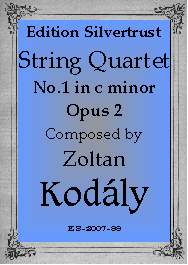Presents
Zoltan Kodály
String Quartet No.1 in c minor, Op.2
 Kodaly's First
String Quartet, composed in 1909, was the direct product of the researches he
undertook with Bela Bartok of Hungarian folk melodies.
Kodaly's First
String Quartet, composed in 1909, was the direct product of the researches he
undertook with Bela Bartok of Hungarian folk melodies.
Zoltan Kodály (1882-1967) and Bela Bartok are widely regarded as the two most important Hungarian composers of the 20th century. Kodály was born in town of Kecskemét and from his father, a keen amateur musician, learned to play the violin as a child. In 1900, he entered the Franz Liszt Music Academy in Budapest where he studied composition with Hans Koessler. After graduating, he began a serious study of Hungarian folk melody. In 1905, he started visiting remote villages and collecting folk songs. Folk melody plays an important part in his music. Kodály later went to Paris where he studied with Charles Widor and was greatly impressed by the music of Debussy and the French impressionists. He composed in most genres, and while he did not write a great deal of chamber music, what he wrote is invariably engaging.
String Quartet No.1 was a landmark work in that it broke with German Romanticism, using original Hungarian folk melody with modern harmony. The opening Andante poco rubato serves as an introduction to the main movement, Allegro, and quotes an actual Hungarian folk song in the statement of the main theme. In the Allegro where our sound-bite starts, the cello announces the theme to a throbbing accompaniment. The second movement, Lento assai tranquillo, is an unhurried fugue. It has as its main theme, a modified version of the opening quote of the Andante, but now in the major. Kodaly creates some very telling tone color episodes with his alternating use of arco and pizzicato passages. Next comes an energetic and exciting scherzo, Presto. The finale, Allegro, is in the form of a theme and an elaborate and brilliant set of variations.
This fine work has been totally and unjustly ignored by performing groups outside of Hungary and Austria which is a shame because it is a masterwork. Though not easy, it is in no way beyond the reach of experienced amateurs. It has never been easy to obtain parts to this work and we are pleased to make it available to a wider audience.
Parts: $24.95